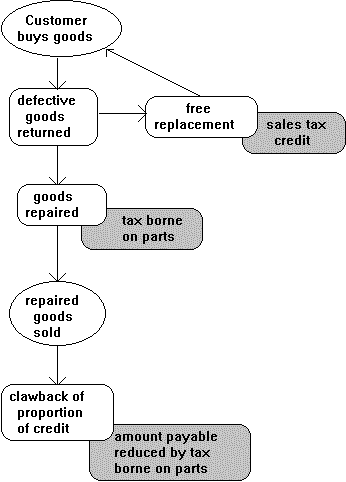Explanatory Memorandum
(Circulated by the authority of the Treasurer the Hon Ralph Willis, M.P.)CHAPTER 15 - SALES TAX - PARTS USED TO REPAIR FAULTY GOODS REPLACED UNDER WARRANTEE
Overview
15.1 The Bill will amend the Sales Tax Assessment Act 1992 to reduce the clawback of sales tax credit involved with goods that have been replaced under warranty, repaired and resold. The reduction will be the amount of sales tax borne on the parts used in the repair.

Summary of the amendments
15.2 To remove the element of double taxation involved in the current amount payable under the clawback of credit provision applying when repaired defective goods are resold. [Clause 138]
15.3 The amendment will apply in relation to sales of defective goods that occur from the date of introduction of the Bill (30 June 1994). [Subclause 2(5)]
Background to the legislation
15.4 A sales tax credit is available when taxable goods are returned and replaced free of charge and under warranty, where the value of the warranty was included in the taxable value of the defective goods. The credit is equal to the amount of tax borne on the replacement goods.
15.5 If the original defective goods are repaired and later resold by the supplier, the credit on the replacement goods is reduced or clawed back. The clawback is calculated according to a formula that represents the extent of the proportion of the original value that is recouped in the sale of the repaired goods. For example, if the sale price of the repaired goods is one-third of their original price, then one-third of the credit allowed is clawed back.
15.6 Where parts are used in the repair there is no provision to allow for an exemption, thus sales tax is payable on the parts. When the clawback occurs, no consideration is given to the tax borne previously on the parts and thus the effect is to again tax the value of the repair parts.
Explanation of the amendments
15.7 Section 58 is amended by reducing the amount payable by the original credit claimant (the claimant), by any amount of tax borne on goods that were used as raw materials in the repair of the defective goods. [Clause 140]
15.8 For the reduction to occur, the claimant must have actually borne tax on the raw materials. Thus, for example, where the claimant buys parts tax paid, repairs the goods with the parts and re-sells the repaired goods, tax has been borne. However, where the claimant arranges for someone else to repair the goods for them and parts used are part of a service contract, the claimant has not borne tax. In this circumstance for tax to be borne, the claimant would need to either supply the parts, having purchased them tax paid, or buy them tax paid separately from the repairer.
15.9 The amendment will apply to amounts payable under section 58 that arise from sales of defective goods that occur from the introduction of this Bill. [Subclause 2(5) and clause 141]
